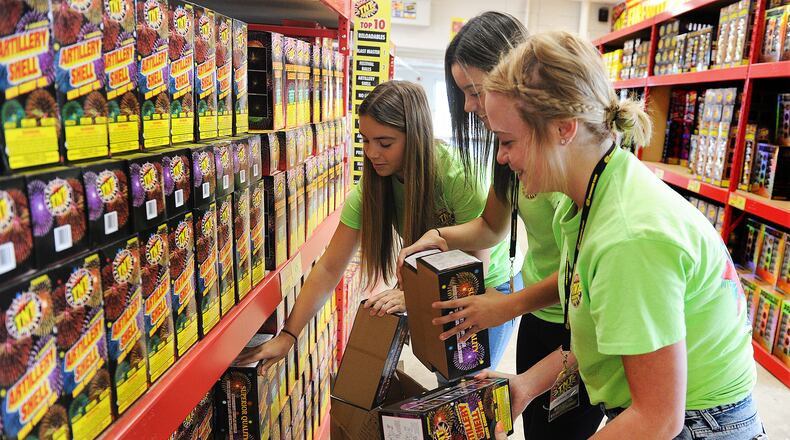A new state law allows Ohioans to set off consumer-grade fireworks on certain designated days — including July 3-5, and the weekends immediately before and after, from 4 to 11 p.m. each of those days. But Dayton, Beavercreek, Germantown, Kettering, Oakwood, and Fairborn are among the cities that have opted out of House Bill 172.
Dayton police are reminding the public that setting off fireworks is illegal in the city despite the new state law.
“Every year the use of fireworks results in injury, death and property damage, and the city of Dayton has not been immune to these tragic situations,” said Maj. Jason Hall, patrol operations division and bomb squad commander. “As this goal relates to the use of fireworks in the city of Dayton, we are hoping to gain voluntary compliance with the city ordinance prohibiting the use of fireworks.”
Hall said police “will continue the enforcement efforts related to fireworks in the same manner as in previous years. We hope that these efforts will result in a safe, and enjoyable environment for our community.”
In 2019, Dayton police reported 212 fireworks-related calls for service. That number skyrocketed to 1,105 calls for service in 2020, then dropped more than 60% to 425 in 2021.
The number of citations issued for discharging fireworks in the city has been low, but steadily increasing. There were two citations issued by Dayton police in 2019. That number went up to eight in 2020 and up to 14 citations issued in 2021.
According to the Ohio State Fire Marshal’s Office, there has been an uptick in the number of injuries and property loss due to structure fires caused by fireworks. However, the number of fireworks-caused fires went down last year.
Credit: FILE
Credit: FILE
In 2019, there were six fires caused by fireworks, with no injuries and $2,800 in reported property loss.
In 2020, the number shot up to 52 structure fires caused by fireworks, causing one firefighter injury and a reported property loss of $250,701.
In 2021, there were 23 structure fires caused by fireworks, leading to one civilian and one firefighter injury and a reported property loss of $313,800.
Andy Ellinger, State Fire Marshal spokesman, said the office does not track the number of complaints received for fireworks and said there may be more EMS runs for injuries that may not have been reported to the state.
The U.S. Consumer Product Safety Commission found a 50 percent increase in deaths and injuries from fireworks-related incidents in 2020, compared to 2019.
- At least 18 people died from fireworks-related incidents in 2020, compared to 12 reported for the previous year.
- About 15,600 people were treated in hospital emergency departments for fireworks injuries in 2020. There were about 10,000 ER-treated fireworks injuries in 2019.
- Of the 18 deaths, 8 of the victims (44%) had used alcohol or drugs prior to the incident.
- Most fireworks-related injuries (about 66%) occurred in the month surrounding the July 4 holiday (from June 21, 2020 to July 21, 2020).
In March, Beavercreek officials said more than half of the fireworks complaints they receive are during the Fourth of July holiday period. Last year, there were 94 fireworks complaints, with 57% occurring during the July 4 holiday.
At that time, Beavercreek City Council voted to reaffirm the city’s fireworks ban.
Alan Hill, Oakwood’s public safety director, said the city “has elected to continue what we’ve established a long time ago,” by continuing its fireworks ban.
Hill said he does not envision getting more complaints on the upcoming July 4 holiday than what they usually get. “It has not been a problem” he said.
Germantown Police Chief Roy McGill, whose community has a fireworks ban, said they get few complaints and he has too few officers to fully enforce their ordinance. He said they issue few if any citations.
“I don’t think it will be any different than in past years,” he said.
The city of Franklin did not opt out of the new state law and one official said some holidays, officers are running “non-stop” responding to fireworks complaints.
City Manager Jonathan Westendorf, a former Franklin fire chief and former president of the Ohio Fire Chiefs Association, said he gave testimony in the Ohio General Assembly in favor of House Bill 172.
Westendorf said there are a lot of safety issues but everyone knows it’s going to happen, and he would rather teach people how to be safe around fireworks.
“If it’s illegal, you can’t spend public funds to train people,” he said. “There is no safe way to train someone to do something illegal.”
Westendorf has worked on a rulemaking committee that includes manufacturers, safety advocates, pediatricians, public safety officials, and Prevent Blindness Ohio representatives.
“We need to teach people when and where not to light fireworks,” Westendorf said. “It’s not that we want this, but it’s the reality of our culture.
Fireworks safety tips
- Never allow young children to play with or ignite fireworks, including sparklers, which burn very hot.
- Keep a bucket of water or a garden hose handy
- Light fireworks one at a time, then move away quickly.
- Never try to relight or handle malfunctioning fireworks. Soak them with water, and throw them away.
- Never place any part of your body directly over a fireworks device when lighting the fuse.
- Never point or throw fireworks (including sparklers) at anyone.
Source: U.S. Consumer Protection Safety Commission
About the Author


